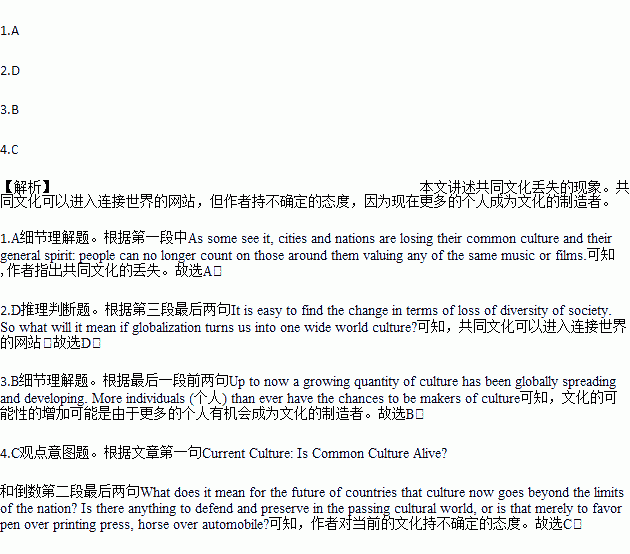题目内容
Current Culture: Is Common Culture Alive?
The digitizing and globalizing world is changing the working of culture. As some see it, cities and nations are losing their common culture and their general spirit: people can no longer count on those around them valuing any of the same music or films. Others argue that a common culture is not dying so much as changing forms: it is less and less attached to a particular area and ever more linked to global networks.
The facts lead to the change that anyone can become a cultural producer today, that the culture is increasingly available everywhere you want it, and whenever you want it, not just in the two months after the movie or book came out. Cultural possibilities have multiplied as a result, but the change also means fewer cultural moments. It is easy to find the change in terms of loss of diversity of society. So what will it mean if globalization turns us into one wide world culture?
For the enthusiasts of these changes, culture is not about popular artists or books, but centers on platforms like Google and Wikipedia, where every variety of culture brings about the exchange of knowledge and ideas, and makes connections across boundaries. It is perhaps debatable whether two people who have participated in such websites, but in totally different corners of them, have had a cultural experience in common. In fact, these platforms become very successful with a large crowd of people, who build things together, share information, and forward articles back and forth. Here are still more questions. What does it mean for the future of countries that culture now goes beyond the limits of the nation? Is there anything to defend and preserve in the passing cultural world, or is that merely to favor pen over printing press, horse over automobile?
Up to now a growing quantity of culture has been globally spreading and developing. More individuals (个人) than ever have the chances to be makers of culture, even if that means more to choose from and fewer standards to be reached in common. What it means is this strange feeling: that of being more connected than ever, with one-click access to so much of the cultural harvest around the world, and yet, of being starved for having similar interests and opinions with others, concerned only with ourselves.
1.In Paragraph 1 the author indicates ______.
A. the missing of common culture
B. the cultural diversity among people
C. the disadvantage in the digitizing society
D. the double standard of cultural evaluation
2.It can be inferred from Paragraph 3 that ______.
A. people feel satisfied with the current culture
B. enthusiasts look for current culture from famous artists
C. disappearance of common culture is a problem to be solved
D. common culture may exit into websites that connect the world
3.According to the author, the increase of cultural possibilities can be caused by ______.
A. agreement with common culture
B. individuals as cultural producers
C. popular artists and books available
D. a reduction in development of culture
4.What is the author’s attitude towards current culture?
A. Uninterested.
B. Approving.
C. Uncertain.
D. Critical.
 小学课堂作业系列答案
小学课堂作业系列答案 金博士一点全通系列答案
金博士一点全通系列答案Stress(压力) is everywhere in our everyday life. Not only men have it, but also women and young people.
The most important reasons of stress are:death, diseases, exams, making money, getting married, moving houses, changing jobs, ending friendships and so on …
How do you know whether you have stress? Could you give your answers to the following questions?
Yes | No | |
Do you easily get angry? | ||
Do you often sleep badly? | ||
Do you get headaches a lot? | ||
Do you take sleeping pills? | ||
Do you find it difficult to relax? | ||
Do you usually hide your feelings? | ||
Do you smoke and drink a lot to keep quiet? | ||
Do you find it difficult to put your heart into something? |
If you answer “Yes” to more than two of these questions, you are one of those people with stress. So what can you do about it?
Doing relaxing exercises, talking with friends and listening to light music are all usual ways of relieving(减轻) stress. However, doctors now say that there are easier ways—people should laugh and smile more often. When you laugh and smile, your body relaxes. They also say that people, especially men, should cry more often, because crying is the natural way of relieving stress.
1.Who has got stress in his everyday life?
A. Men. B. Women.
C. Young people. D. All the above.
2.If you have over problems listed in the table, you are the person with stress.
A. two B. three
C. five D. eight
3.Which of the followings is NOT the reason of stress?
A. Taking exams. B. Changing jobs.
C. Taking sleeping pills. D. Making money.

